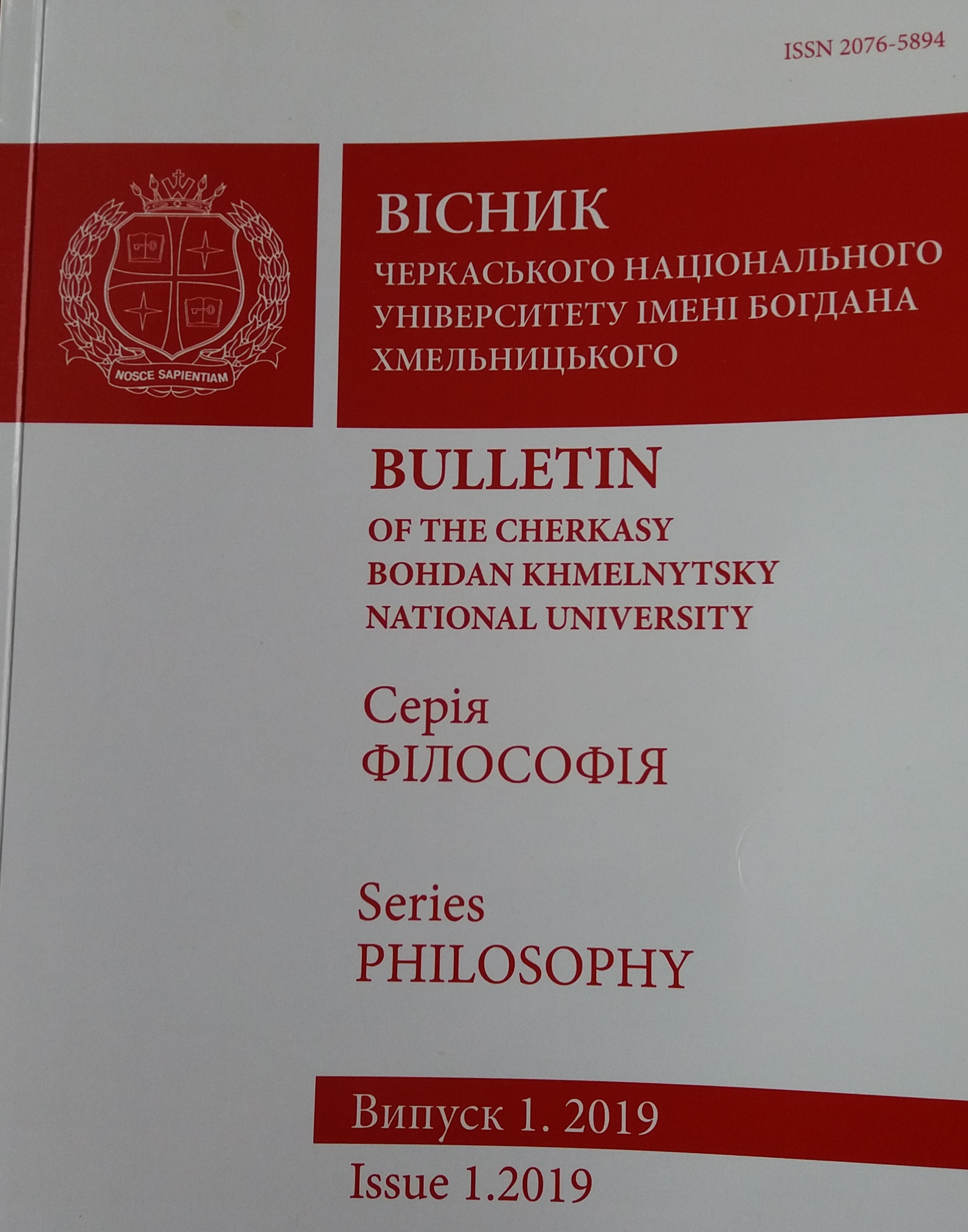THE PROBABILISTIC SUBJECT AS AN AGENT OF PARODIC NARRATIVE IN A POSTMODERN TEXT
Main Article Content
Abstract
Summary. Introduction. The article is devoted to the specificity of correlation between the philosophical subject and the parody, grotesque and avtoparody with the structural and semantic principles of organization of postmodern text. Obviously, the discourses of humanitarian knowledge, including literary ones, become problematization in terms of the subject and the reality of particular relevance.
The purpose of the article is to raise the question of the subject's transformation in the postmodern narrative in the conditions of parody, considered as the regulatory principle of the text and discourse.
Methods used in the study: textual analysis of sources, historical and philosophical analysis, analytical and hermeneutical methods in combination with contemporary history of ideas and culturological approach.
The results of the study are due to the following considerations. It goes on to attempt to rethink the notion of metapoetics of postmodern text. Since the poetics of the postmodern text appears as a dissipative system, and its conditional objects or subjects as relativistic chaos that pretends to be a system, it seems appropriate to label this contour phenomenon with the term “metapoetics” that encompasses the indicated open nature of text-reality and reality text "in the context of the interpretation of parody and the grotesque not as artistic and aesthetic categories or methods, but ontologizing, semantic structures of the text. The object of the study of metapoetics is not only the verbal creativity, the artistic and linguistic discourse, in which there is a reflection on the author's and other's texts, but the consideration of the system, "the author - the linguistic reality – the text" as an open structure, not limited to the frame frame of the "auto metadescription.
The originality and novelty of the research lie in the proposed interpretation of the concepts of a probabilistic subject in the postmodern text and narration, as well as in the metapoetic of the postmodern text.
Conclusion. Although postmodernism rejects the author as a subject and narrator, but since all this occurs in the space of speech and the linguistic description of reality, there is no going beyond the limits of the linguistic picture of the world in the text itself. This exit is provided within the process of creating meanings by the recipient, in the noetic act of the probabilistic subject.
Article Details
References
Kretov, P. V., Kretova, E. I. (2018). Philosophy of Information, Project of Narrative Ontology and Modern Picture of the World. Setevoi nauchnyi zhurnal “Filosofskie problem informatsionnykh tehnologii i kiberprostrsnstva (Network scientific journal “Philosophical Problems of Information Technologies and Cyberspace”), 1(14). Retrived from http://cyberspace.pglu.ru/issues/detail.php?ELEMENT_ID=245116 (in Russ.).
Taylor, V. E. (2003). Dyferend. Encyclopedia of Postmodernism, 128-129. Kyiv: Publisher Solomia Pavlychko (in Ukr.)
Man’kovskaya, N. B. (2000). Aesthetics of postmodernism. Moscow: Aletheia (in Russ.)
Epstein, M. (1988). Paradoxes of novelty. On the literary development of the XIX-XX centuries. Moscow: Soviet Writer (in Russ.)
Zatonsky, D. (2000). Modernism and Postmodernism: Thoughts on the Eternal Rotation of Fine and Non-Fine Arts. Kharkov: Folio; Moscow: AST (in Russ.)
Knyazeva, Ye. N. (2014). Enactivism: a new form of constructivism in epistemology. Moscow–SPb.: Center for Humanitarian Initiatives; University Book (in Russ.)
Miller, J. (2014). The Writing Process of Donald Barthelme. CUNY Academic Works. Retrived from https://academicworks.cuny.edu/cgi/viewcontent.cgi?article=1247&context=cc_etds_theses
Habermas, Yu. (2001). Philosophical discourse of modernity. Kyiv: Fourth Wave (in Ukr.)
Stein, K. E. (1999). Metapoetika: “blurred” paradigm. Text: Patterns of carpet, 4, 1: General problems of the study of the text, 5-14. St. Petersburg – Stavropol: Publishing house of SSU (in Russ.)
Hutcheon, L. (1985). Theory of Parody. The Teachings of Twentieth-century Art Forms. New York: Methuen.
Pigulevsky, V. O. (2002). Irony and fiction: from romanticism to postmodernism: Scientific publication. Rostov-on-Don: Publishing House "Foliant". Retrived from http://www.urgi.info/urgiinfofiles/sites/pigulevsky-ironiya/04_paragraf_4-2.htm (in Russ.)
Bart, R. (2000). Mythology. Mythologies. Moscow: Publisher Sabashnikov (in Russ.)
Yurkov, S. E. (2001). Postmodernism: Approaching an Anti-World. Proceedings of the Scientific Conference October 10, 2001. Series “Symposium”, Aesthetics in Interparadigmatic Space: Perspectives of the New Age, 16, 85-88. St. Petersburg: St. Petersburg Philosophical Society (in Russ.)
González Rodríguez, L. M. (2012). Intertextuality and Collage in Barthelme’s short fiction. Short Story Theories. A Twenty-First-Century Perspective, 49, 249-269.
Kusnir, J. (2007). Reality, Imagination and Possible Worlds in American Postmodern Fiction – Barthelme's Short Story “The Dragon”. Dream, Imagination and Reality in Literature. South Bohemian Anglo-American Studies, 1, 34-40.
Nagel, T. (2014). What is it like to Be a Bat. Anthology of modern analytical philosophy, or beetle leaves a box, 203-222. Lviv: Chronicle (in Ukr.)
Zhizhek, S. (1999). Sublime object ideology. Moscow: Art Magazine (in Russ.)

